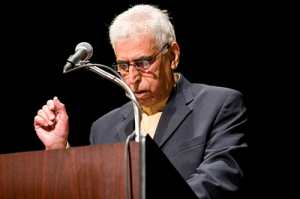Poet Saadi Youssef on the Beauty of Arabic and Difficulties of Translation
 I am re-re-reading Radwa Ashour’s Specters (you wouldn’t want me to do a slipshod review!) and was recently at the part where Ibrahim Nasrallah, Mourid Bargouti (Ashour’s husband) and Saadi Youssef are trying to enter Egypt for an Arabic poetry festival.
I am re-re-reading Radwa Ashour’s Specters (you wouldn’t want me to do a slipshod review!) and was recently at the part where Ibrahim Nasrallah, Mourid Bargouti (Ashour’s husband) and Saadi Youssef are trying to enter Egypt for an Arabic poetry festival.
It was 1993. Ashour thought that, because her (Palestinian) husband had been invited by Egypt’s General Organization of Cultural Centers, this would be an easy entrance. But:
An hour passed, two hours. One of the two [council] employees went into the customs area, then came back. He called the Council. Back he went again. I called Tamim.
‘What’s the problem?’ he said.
‘Maybe it’s your Uncle Saadi, because he’s Iraqi, maybe it’s Papa—I don’t know.’
…
We kept waiting until our Three Musketeers appeared: Ibrahim Nasrallah—they let him in, but in solidarity with Mourid and Saadi he refused to enter. Three and a half hours later they let Saadi in—for Mourid’s sake, he waited with Ibrahim Nasrallah. Finally they let Mourid in, and the three of them emerged. We got home to Ramez Street a little before nine o’clock.
And because we swallow all this and refrain from choking on it, it stays down.
Then, yesterday, I saw that Sinan Antoon had posted three new translations of poems in Youssef’s 2009 collection, al-A`mal al-Shi`riyya: al-Juz’ al-Sadis, on Jadaliyya.
Youssef is certainly more well-known that, for instance, now-deceased Iraqi poet Sargon Boulos. Youssef’s collection Without an Alphabet, Without a Face was translated by Khaled Mattawa and published in 2002 by Graywolf Press. It won the 2003 PEN Award for Poetry in Translation.
Still, I thought I would dig up a little about Youssef, and I was not disappointed. The poet speaks here with interviewer Joy E. Stocke. She asks him to talk about the Arabic language:
First of all, I can’t write poetry in any other language. Impossible. I have to write in Arabic because each language has its own history and Arabic is my history. I consider Arabic to be the most beautiful language.
JOS: Why?
Well it is a very free language. I mean you can create new words in Arabic. So, you can say that it is an open language, a language that a poet can always renew. If you know Arabic well with a classical formation, in a way you will be more free because you will see more things. You can work within the language to create a new word and it will be understood. It will not be considered strange.
For example, when you hear the church bell toll, or ring. In Arabic, if you take the past tense for the sound of a bell ringing — the bell rang — I can extend the sense of time that it takes for a bell to ring. Instead of saying rang, I can use the language to create a new word that shows the extended way a bell rings, how the sound moves through the air. I create a new word because I need to do so, and a reader of Arabic will understand. In fact a reader of Arabic will expect it.
And about the translation of his poetry from Arabic into English:
…for example, my collection of poems Without an Alphabet, Without A Face (Graywolf Press), I corresponded with the translator, Khaled Mattawa. We kept corresponding and I would ask him about this thing or that thing. It is very difficult to capture the music of Arabic poetry, but Mattawa knows both languages very well.
Still, it is very difficult to get English exactly close to Arabic because the system is so different. The music of the poem sounds different so really, you try to have two poems with the same tone and feeling.
Read Saadi Youssef’s poetry for yourself:
From Jadaliyya, three poems translated by Sinan Antoon: Fulfillment, Conversation, and O Nostalgia: My enemy.
From Banipal 15/16, Elsinore, Hamlet’s Castle, translated by Sargon Boulus.
From Words Without Borders, seven poems translated by Khaled Mattawa: Five Crosses, The Bird’s Last Flight, Koofa, A Shiver, The Jazz Corner, Departure ‘82 and Silence.
From The Poetry Center, three poems, also translated by Khaled Mattawa: Solos on the Oud, The New Baghdad and Poetry.
From Blue Moon Review, two poems translated by Mattawa: Shatt Al-Arab and Thank You Imru Ul-Qais.
From Poems About War, translated by Khaled Mattawa, from America, America.
More poems (in English translation and in Arabic) on Saadi Youssef’s website.

October 16, 2010 @ 8:01 pm
thank you! I never thought there are so many English translations on the web
October 17, 2010 @ 4:55 am
You’re very welcome.
Always appreciate comments and criticisms! Thanks, M.